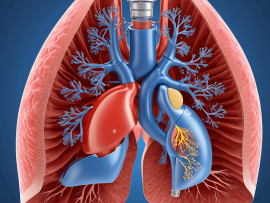Abstract Introduction Postoperative delirium affects up to 60% of cardiac surgical patients. No reliable gold standard method exists for preventing delirium after cardiac surgery. An example of patient-personal monitoring is..
Read MoreAbstract Purpose of review This review addresses the growing concern over nosocomial infections in patients undergoing extracorporeal membrane oxygenation (ECMO) and/or continuous renal replacement therapy (CRRT). As the use of..
Read MoreAbstract Extracorporeal cardiopulmonary resuscitation (ECPR) has evolved into a life-saving therapy for select cardiac arrest patients, yet a growing body of evidence suggests it also holds promise as a bridge..
Read MoreAbstract Background The optimal cerebral protection strategy during complex aortic surgery remains controversial, and various brain monitoring modalities are used to provide different information to improve cerebral protection. This study..
Read MoreAbstract In humans, the transfer of respiratory gases between the atmosphere and living cells depends on their diffusion between lungs, blood, and cells, as well as their advective transport by..
Read MoreAbstract Introduction Limb loss after combat injury is a major factor for morbidity in combat casualties. Although tourniquets clearly save lives, they can result in prolonged ischemia in large scale..
Read MoreAbstract Extracorporeal membrane oxygenation (ECMO) supports patients with severe refractory cardiac or respiratory failure but managing residual circuit blood after weaning lacks consensus. After decannulation, the oxygenator and circuit retain..
Read MoreAbstract Perioperative hyperglycemia is associated with increased morbidity and mortality. We report the findings of our quality improvement project on the use of an electronic insulin dosing calculator (EIC) to..
Read MoreAbstract Objective To evaluate the robustness of randomized controlled trials (RCTs) investigating acute normovolemic hemodilution (ANH), a blood conservation strategy designed to reduce transfusion requirements, in cardiac surgery using the..
Read MoreAbstract The 2025 European Resuscitation Council (ERC) Guidelines present the most up-to-date evidence-based guidelines for the practice of resuscitation across Europe. The ERC Guidelines 2025 are based on evidence produced..
Read MoreAbstract Cardiac surgery, particularly procedures involving cardiopulmonary bypass (CPB), is associated with a high risk of postoperative complications, including systemic inflammatory response syndrome (SIRS), postoperative atrial fibrillation (POAF), and infection...
Read MoreAbstract Purpose Oxygen delivery (DO2) during cardiopulmonary bypass (CPB) is critical in preventing postoperative complications in adult cardiac surgery. This systematic review aimed to assess the relationship between intraoperative DO2 during..
Read MoreAbstract Objectives: To evaluate the relationship between the duration of pre-extracorporeal membrane oxygenation (ECMO) mechanical ventilation and mortality in acute respiratory distress syndrome (ARDS) patients undergoing venovenous ECMO. Design: Retrospective..
Read MoreAbstract The demand for homologous blood transfusions has reached an unprecedented level, driven by a declining donor population and the ever-increasing need for blood products. While significant advancements have been..
Read MoreAbstract Decisions regarding veno-venous extracorporeal membrane oxygenation (vv-ECMO) in patients with acute respiratory distress syndrome (ARDS) are often based solely on clinical and physiological parameters, which may insufficiently reflect severity..
Read MoreAbstract Background Maintaining adequate oxygen delivery during cardiopulmonary bypass (CPB)-assisted cardiac surgery is crucial, but hyperoxia has been suggested to cause organ injury. We compared the effects of restrictive vs liberal oxygenation..
Read MoreAbstract BACKGROUND: Major bleeding after cardiac surgery is still a relatively common complication, requiring red blood cell (RBC) transfusions and use of procoagulants. The existing guidelines recommend a bleeding management..
Read More













